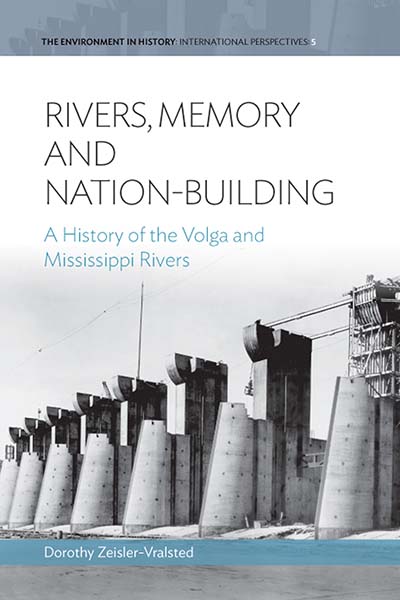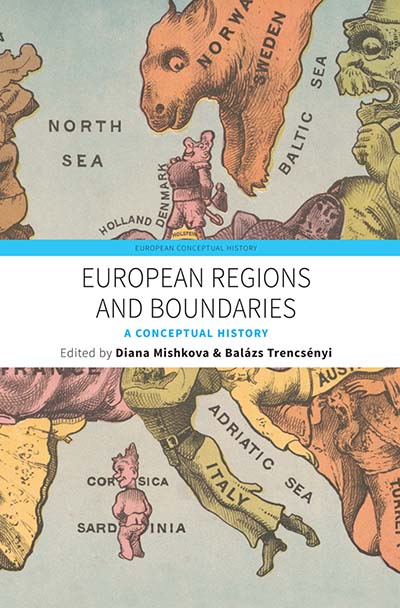
Series
Volume 5
Environment in History: International Perspectives
See Related
History JournalsEmail Newsletters
Sign up for our email newsletters to get customized updates on new Berghahn publications.
Rivers, Memory, And Nation-building
A History of the Volga and Mississippi Rivers
Dorothy Zeisler-Vralsted
204 pages, 20 illus., Bibliog., Index
ISBN 978-1-78238-431-1 $135.00/£104.00 / Hb / Published (November 2014)
eISBN 978-1-78238-432-8 eBook
Reviews
“The book will serve as a wellspring for more specific comparisons and as a methodological example for future scholarship.” · Choice
“…[a] well-written, thoughtful, and engaging study… This work’s novelty is its comparative approach in its examination of diverse narratives and in its use of the sources of collective memory—prose, poetry, art, and song, as well as engineering studies, and public pamphlets and documents…This book is welcome as a contribution to the history of rivers, comparative and transnational history, environmental history, and history of technology. It can be used in high schools or universities.” · Journal of Anthropological Research
“There is much to celebrate about Rivers, Memory, and Nation Building; its comparative international perspective is something that environmental historians undertake far too infrequently. The approach is bold, refreshing, and insightful. Anyone who takes the time to read this well-written and carefully organized study will come away with a good understanding of the roles of the Mississippi and Volga Rivers in the history of their respective nations. If this volume also stimulates a discussion of how we interpret and explain the environmental history of rivers that would be an additional, important contribution to the field.” · Canadian Journal of History
“All told, despite the obvious constraints such as limited access to Russian-language sources, this is a very good book. It is interesting, informative and thought-provoking at many levels. It is written with a degree of balance which is much to be commended. And it certainly makes an important contribution to environmental history, to historical geography and, not least, to Russian Studies.” · Human Ecology
“The arguments and themes in Rivers, Memory and Nation-Building are credible, and the book as a whole is both engaging and well researched… Despite the relatively short length, Dorothy Zeisler-Vralsted has given us a readable history that is thoroughly documented, persuasively written, and historiographically significant. Most notably, the book brings an important component to the study of environmental history—a comparative perspective… The infusion of a comparative and international analysis is welcome and refreshing.” · Environmental History
“The main themes and insights are strong ones…As well as offering a worthy and inspired comparison, this is a genuine and systematic comparison with a clear structure and steadily building momentum: a good balance is struck between the two rivers and the author frequently alternates between them, but without confusing the reader.” · Peter Coates, The University of Bristol
“This is a concise and convincing comparative discussion of two major rivers. It is clearly shown that political systems were less important than the overarching twentieth century idea of modernization…Harnessing rivers for a free world was a common view – different ideas of ‘freedom’ may have existed, but the rivers were to be harnessed in strikingly similar ways. The comparative approach of the book, supported by appropriate details of each river and projects, allows for pointing out the main issues, questions and evidence, and shows how alike the two opposing political systems were when it came to river development.” · Maurits Ertsen, Delft University of Technology
Description
Rivers figure prominently in a nation’s historical memory, and the Volga and Mississippi have special importance in Russian and American cultures. Beginning in the pre-modern world, both rivers served as critical trade routes connecting cultures in an extensive exchange network, while also sustaining populations through their surrounding wetlands and bottomlands. In modern times, “Mother Volga” and the “Father of Waters” became integral parts of national identity, contributing to a sense of Russian and American exceptionalism. Furthermore, both rivers were drafted into service as the means to modernize the nation-state through hydropower and navigation. Despite being forced into submission for modern-day hydrological regimes, the Volga and Mississippi Rivers persist in the collective memory and continue to offer solace, recreation, and sustenance. Through their histories we derive a more nuanced view of human interaction with the environment, which adds another lens to our understanding of the past.
Dorothy Zeisler-Vralsted is Professor of Government and International Affairs at Eastern Washington University. Her research in rivers and water resources has been published by UNESCO, Environment and History, as several book chapters, and in numerous regional journals. Prior to her academic research, she worked in the public sector in water rights and researched and consulted for water rights litigation.


